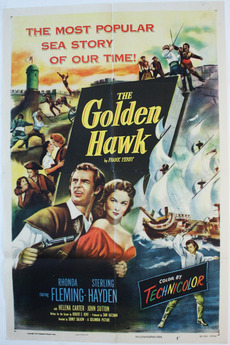Plot
During the 17th century a French sea captain, Kit 'The Hawk' Gerardo is on Basse-Terre Island with a crew but no ship. He duels the captain of the ship Sea Flower, and commandeers his ship. His objective is to capture a far larger 60-gun ship under command of a Spanish pirate, Luis del Toro, partly for loot but also believing him responsible for the death of Kit's mother, Jeanne Buoyant.
A female pirate who calls herself Captain Rouge disguises herself as a Dutch maid in order to board a vessel. The Hawk lends her his flintlock pistol with which to defend herself in her cabin at night, resulting in her shooting and wounding Kit when he attempts to make romantic advances. Rouge escapes through the window and swims to an island.
After several battles against Spanish ships Kit takes captive a mother and daughter, Bianca, who says she is betrothed to del Toro, and begins another love affair. He demands 10,000 pieces of gold for her safe return. Del Toro pays, then surrounds Kit with three of his ships to take it back. Kit floats a raft of gunpowder out to the ships in the night and blows one up. Nevertheless, when he tries to escape he is captured.
Rouge wants half the loot for herself. In a raid of Jamaica on orders of the king, Kit discovers that the property once belonged to Rouge, who is a British subject, Lady Jane Golfin, trying to retrieve the riches that have been illegally taken from her family.
Kit breaks into the Spanish fortress to blow it up, hoping for the help of Bianca who resides there, but he is captured. Del Toro reveals to Bianca that he is Kit's father and the death of his mother was an accident.
Kit ends up tried, convicted and sentenced to hang. Rouge materialises and confronts Bianca. Rouge disguises herself as a man and cons her way into Kit's prison cell. Meanwhile, the Sea Flower and multiple French men o'war make an attack on the fortress. Kit finds the gunpowder store and blows up the fortress. Del Toro is taken prisoner and father and son are reunited. Kit also decides it is Rouge that he loves.
This page is based on this
Wikipedia article Text is available under the
CC BY-SA 4.0 license; additional terms may apply.
Images, videos and audio are available under their respective licenses.
